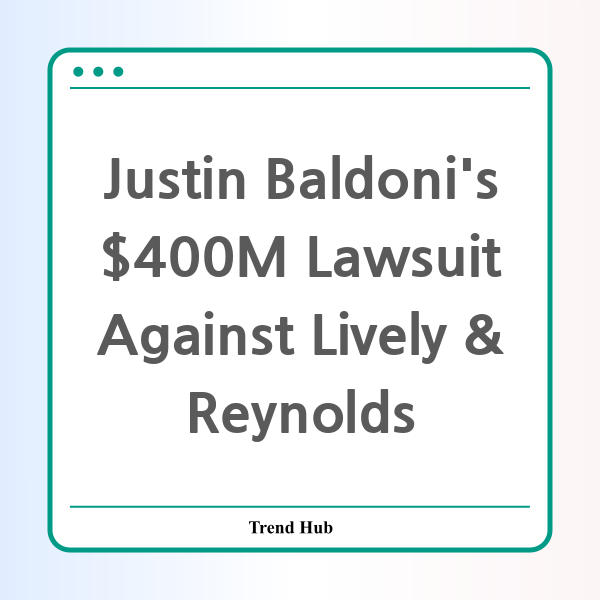* This website participates in the Amazon Affiliate Program and earns from qualifying purchases.

In the heart of Hollywood, where glitz and glamour often mask the undercurrents of intense rivalry, a significant legal battle is unfolding. Justin Baldoni, the acclaimed director and actor, has launched a staggering $400 million lawsuit against famous couple Blake Lively and Ryan Reynolds. This lawsuit is not only about money; it raises profound questions about power dynamics in the entertainment industry, creative control, and personal reputations.
Baldoni claims that Lively and Reynolds sought to tarnish his reputation by engaging in what he describes as a smear campaign related to the film It Ends With Us, which he directed and starred in alongside Lively. The lawsuit comes amid allegations of sexual harassment and defamation that Lively leveled against Baldoni during the film's production. In a surprising twist, Baldoni's legal team counters these allegations, asserting that it was Lively who attempted to take over the film and dismiss its thematic integrity.
The intricacies of the lawsuit detail a professional relationship that began with collaboration but soured over creative disagreements. Baldoni describes incidents of personal conflict, including accusations of fat-shaming, that contributed to a hostile working environment. The explosive nature of these accusations highlights a larger issue in Hollywood—how power can be wielded by celebrity status to influence narratives and create an imbalance in professional relationships.
Baldoni's lawsuit is not just a legal maneuver; it’s a bold statement about the struggles directors and creators face in an industry often dominated by star power. He claims that his reputation has been irreparably damaged and that the consequences of Lively's actions have extended far beyond the film set, threatening his career and livelihood.
The legal document, which spans a dense 179 pages, outlines serious charges, including defamation, civil extortion, and intentional interference with economic advantage. Baldoni's attorneys argue that they possess substantial evidence, ranging from text messages to emails, that support their claims against Lively and Reynolds.
As the public eagerly follows this unfolding drama, another layer to the legal saga has emerged: Baldoni has demanded that Disney and Marvel preserve all documents related to Ryan Reynolds' character, Nicepool, in the recently released film Deadpool & Wolverine. This character has been interpreted by some as an affront to Baldoni amidst his ongoing feud, raising concerns about how creative works may become platforms for personal jabs between Hollywood figures.
The implications of this lawsuit extend beyond Baldoni and the couple at its center. It highlights issues of accountability and the often murky waters of Hollywood ethics. When does artistic expression become personal attack? The lawsuit raises questions about the responsibilities that come with fame and how individuals in powerful positions should navigate their influence.
Hollywood is no stranger to lawsuits, but this particular case underscores a shift in how grievances are aired and contested in the public eye. As more details emerge, the entertainment community is watching closely to see how this can reshape power dynamics moving forward.
In conclusion, Justin Baldoni's lawsuit against Blake Lively and Ryan Reynolds is more than just a legal dispute; it’s a cautionary tale about the implications of fame, power, and integrity in Hollywood. With pending court dates and the potential for more revelations, audiences are left wondering how this chapter will unfold and what it means for those who dare to challenge the status quo.
* This website participates in the Amazon Affiliate Program and earns from qualifying purchases.